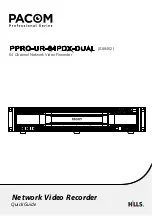
001-5006-000_FCC.docx
Page 24
Table 2.3 RSSI Reliability
RSSI
Reliability
-100 dBm
Approximately 50% reliability. Fading may cause frequent data loss.
-90 dBm
Approximately 90% reliability. Fading will cause occasional data loss.
-80 dBm
Approximately 99% reliability. Reasonable tolerance to most fading.
-70 dBm
Approximately 99.9% reliability with high tolerance to fading.
2.7
RADIO INTERFERENCE
Interference is possible in any radio system. However, since the Guardian is designed for
use in a licensed system, interference is less likely because geographic location and existing
operating frequencies are normally taken into account when allocating frequencies.
The risk of interference can be further reduced through prudent system design and
configuration. Allow adequate separation between frequencies and radio systems. Keep the
following points in mind when setting up your radio system.
a.
Systems installed in lightly populated areas are least likely to encounter interference,
while those in urban and suburban areas are more likely to be affected by other
devices.
b.
Directional antennas should be used at the remote end of the link. They confine the
transmission and reception pattern to a comparatively narrow beam, which
minimizes interference to and from stations located outside the pattern.
c.
If interference is suspected from another system, it may be helpful to use antenna
polarization opposite to the interfering system’s antennas. An additional 20 dB (or
more) of attenuation to interference can be achieved by using opposite antenna
polarization.
d.
Check with your CalAmp sales representative or CalAmp Technical Services for
additional options. The Technical Services group has qualified personnel to help
resolve your RF issues.
















































